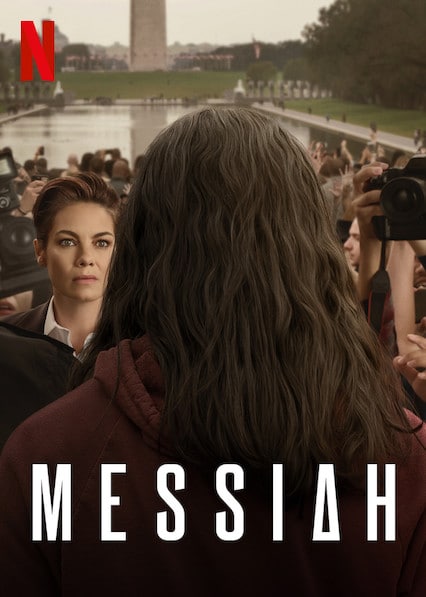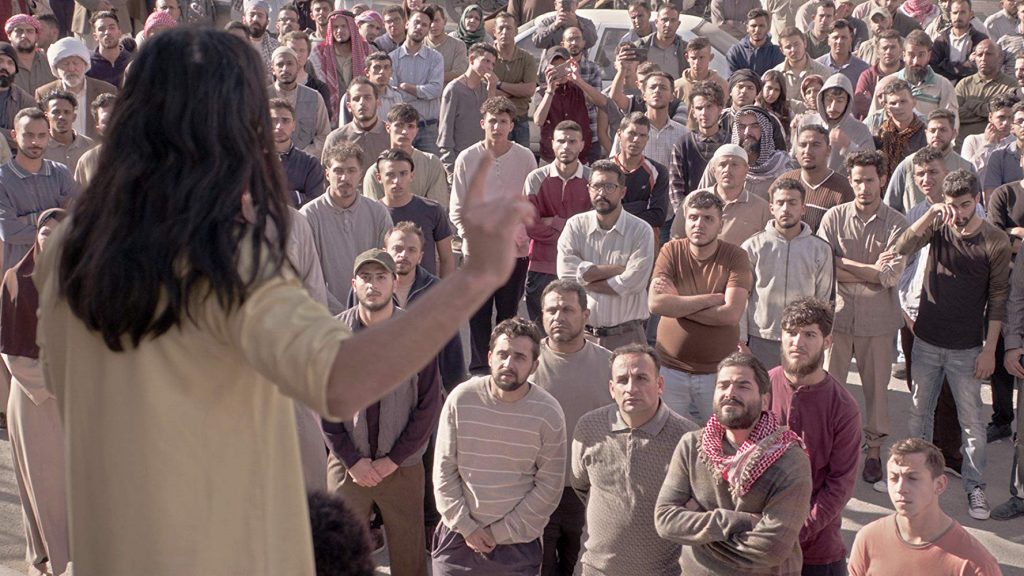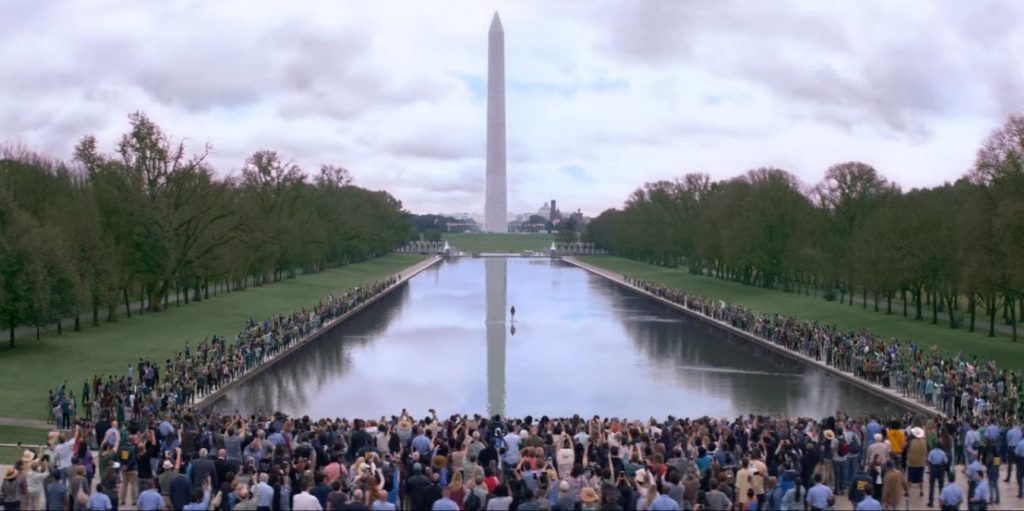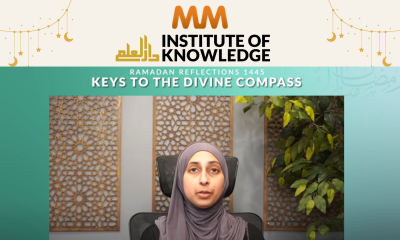#Culture
Messiah, A Fitnaflix Production

Published

Netflix released Season 1 of a new thriller series called “Messiah”. The series imagines the emergence of a character claiming to be sent by God, the Messiah, or Al-masih (messiah in Arabic) as he is referred to in the television series.
This so-called Al-masih first emerges in Damascus at a time when ISIS is about to storm the city. He then appears in Palestine, Jordan and ultimately America. Along the way, he performs miracles and dumbfounds the Israeli and American intelligence officers charged with tracking him and figuring out who is enabling him. The season ends with a suggestion that he is truly a divine man, with the ultimate miracle of reviving the dead.
The entertainment value here is quite limited. Some stretches of the series are just flat or straight out boring, and the acting is not all that great. However, the series does create an opportunity for discussion about Muslim eschatology (the knowledge of the end of times), response to fitnah (faith testing tribulations) and Muslims portrayal in and consumption of entertainment media.
Keep supporting MuslimMatters for the sake of Allah
Alhamdulillah, we're at over 850 supporters. Help us get to 900 supporters this month. All it takes is a small gift from a reader like you to keep us going, for just $2 / month.
The Prophet (SAW) has taught us the best of deeds are those that done consistently, even if they are small. Click here to support MuslimMatters with a monthly donation of $2 per month. Set it and collect blessings from Allah (swt) for the khayr you're supporting without thinking about it.
The series shows some sophistication in the portrayal of Muslim characters relative to what people have been accustomed to with Hollywood. Characters that are situated in the Middle East are performed by actors from that region who speak authentic regional Arabic (including Levantine and North African dialects). The scenes appear authentic. While this is progress, it is limited, and the series falls into oversimplification and caters to typical stereotypes. While several Muslim characters draw the viewers’ empathy, they are not used to provide context or nuance for issues that the series touches on: ISIS, refugees, the Israeli occupation and suicide bombings. The two American Muslim characters are never really developed. In fact, all Muslim characters tend to be “flat” and one dimensional. This is in contrast, for example, to American and Israeli characters which appear multi-dimensional and complex, often dealing with personal challenges that a Western audience is likely to identify with (caring for an aging parent, mourning the loss of a spouse, balancing career and life, dealing with family separation, abortion, etc.). While Muslim characters are shown as hapless refugees, terrorists, religious followers, political activists, a university professor and student, their stories are never developed.
The show repeatedly refers to Jerusalem as Israel’s capital. There is also consistent normalization of Israeli occupation and glorification of the occupying forces.
Islamic eschatology
Orthodox Muslims affirm a belief in “the signs of the End of Times, including the appearance of the Antichrist, and the Descent of Jesus 

- Imam Mahdi, who is a just ruler who will share the Prophet’s
name.
- The False Messiah (Antichrist), or Al-Masjih Al-Dajjal, who will be the greatest fitna to ever to afflict this Ummah.
- The True Messiah, Isa ibn Maryam, who returns in the end of days, kills the Antichrist and rules for 40 years and establishes justice and prosperity – close to the time of the day of judgement.
The Prophet Muhammad 

Al-Dajjal comes after a period of famine and drought. He will be one-eyed and will claim to be God. Believers will recognized a mark or word of disbelief on his forehead. He will perform many miracles. He will endow those who follow him with material prosperity and luxury, and those who deny him will be inflicted with deprivation and suffering. He will travel at high speeds, and roam the whole world, except Makkah and Madinah, which he will not be able to enter. He will create a heaven and hell, command rain, the earth, animals, and resurrect the dead – all supernatural occurrences that he has been afforded as a trial and test for others. The Prophet Muhammad 
Reflections on the series and lessons to be learned
The Prophets and the righteous are not tricksters and riddlers.
The Netflix series portrays the character ‘al-masih’ as someone who speaks cryptically; it is never clear what he is teaching and why. He leads his followers on long physical journeys without telling them where they are going or why. He speaks in riddles and tortures his followers with mental gymnastics and rhetorical questions.
On the other hand, a true prophet of God offers real guidance and brings clear teachings and instructions – the Prophet Muhammad 

What Netflix got right and what it got wrong
The Al-masih character initially emerges in Damascus (and the Islamic tradition mentions Isa ibn Mariam 

photo credit: IMDb
However, numerous features of Dajjal would make his identity obvious to believers, not the least of which is that the word ‘disbeliever’ will be written – whether literally or metaphorically (scholars differ) – on his forehead in such a manner which even those unlettered would be able to read. Physically, Dajjal is a short man, with a deformity of his legs, and one of his eyes is likened to a “floating grape”, sightless, and “green like glass”. The Prophet is said to have focused on these physical features because they are so manifest and eliminate any confusion.
Al-Dajjal’s time overlaps with that of two other eschatological figures – Imam Mahdi and Esa ibn Maryam 

Safeguarding against tribulations
The best safeguard is to have sound knowledge of theology and law, and to have our iman rooted in revelation and reason. For example, the most basic understanding of Islamic theology would lead us to reject any man who claims to be God, as Al-Dajjal will claim. With basic Islamic knowledge and reasoning, we would know that Allah does not manifest in human-like form, much less one that is deformed, as Allah is the all Powerful and Perfect. Could it be that at the end of times even such essential Islamic knowledge is lacking?

Al-Dajjal deceives people by his miracles and supernatural abilities. Our iman should not be swayed by supernatural events and miracles. We should measure people and ideas according to their standing with the Shari’ah. We must keep our heads level and not be manipulated because we cannot explain an occurrence.
Al-Dajjal also lures people by his miracles and by his ability to give them material prosperity, comfort and luxury. We must tie our happiness and sense of satisfaction to eternal spiritual truths, not to the comforts of this life, and be willing to give up what we have for what we believe. We should live simply and not follow into the path of excessive consumerism and materialism.
Another important consideration is not to base our connection to Allah 



Is it time to live on a remote mountain?
The clearest indication of the nearness of the Day of Judgement is the prophethood of Muhammad 

The best you can do is stay calm and make salat!
Muslims and the entertainment media
This increased sophistication and the apparent familiarity with Islamic sources exhibited by Messiah producers should lead us to value the importance of producing accurate, authentic and polished material and content about Islam and Muslims and our community’s role as a source of information.
It is also important for Muslims to produce works for the mass media and entertainment industries. This is no longer the era of the sole MSA Da’wah table. Sophisticated, entertaining and authentic media production is an imperative for modern Muslims. When we don’t tell the story, someone else will.
Make it a Netflix Night?
We may refer to it as Fitnaflix, but let’s all admit that we cannot avoid television and the entertainment industry, for better or for worse. We can however moderate, guide and channel its use. Start breaking the isolation in which many of our children and young adults consume media. Families should watch TV together and use it as an opportunity to model how we select appropriate material and to create teaching and discussion moments. Parents should know what is influencing their kids even if they don’t like it.
Some parts of the series Messiah, despite its flaws (and an explicit sexual scene in episode 9, not to mention profanity), could be used as a teaching moment about trials and tribulations, the end of times and the importance of Muslims engaging in the entertainment industry in a principled and professional manner.
Ed’s note: Much of the series’ content is R-rated. Besides depictions of terrorism and other mayhem, sexual activity and brief rear nudity are shown. Mature themes include abortion, adultery, infertility and alcoholism.
Works Cited
| [1] | T. C. o. I. Al-Tahawi, Hamza Yusuf (trans), Zaytuna Institute, 2007. |
| [2] | O. Al-Ashqar, Al-Qiyamah Al-Sughra, Dar Al-Nafa’is, 1991. |
| [3] | [Online]. Available: https://abuaminaelias.com/dailyhadithonline/2014/06/23/dajjal-emerges-khawarij/. |
Keep supporting MuslimMatters for the sake of Allah
Alhamdulillah, we're at over 850 supporters. Help us get to 900 supporters this month. All it takes is a small gift from a reader like you to keep us going, for just $2 / month.
The Prophet (SAW) has taught us the best of deeds are those that done consistently, even if they are small. Click here to support MuslimMatters with a monthly donation of $2 per month. Set it and collect blessings from Allah (swt) for the khayr you're supporting without thinking about it.
Canadian-Palestinian Dr Idris Elbakri is a medical physicist who lives in Winnipeg. He is the President of the Manitoba Islamic Association. He is a father of four and a leader in the Muslim community in Canada.


[Podcast] Palestine in Our Hearts: Eid al-Fitr 1445 AH

Foreign Affairs Official Resigns Over Gaza Genocide

A Ramadan Quran Journal: A MuslimMatters Series – [Juz 30] Solace For The Sincere And Vulnerable

IOK Ramadan: The Importance of Spiritual Purification | Keys To The Divine Compass [Ep30]

IOK Ramadan: The Power of Prayer | Keys To The Divine Compass [Ep29]

IOK Ramadan: 7 Qualities of Highly Effective Believers | Keys To The Divine Compass [Ep18]

IOK Ramadan: Choose Wisely | Keys To The Divine Compass [Ep15]

IOK Ramadan: Shake the Trunk of the Tree | Keys To The Divine Compass [Ep16]

IOK Ramadan: They Were Not Created Without Purpose | Keys To The Divine Compass [Ep23]

IOK Ramadan: Appreciating the Prophet ﷺ | Keys To The Divine Compass [Ep22]

IOK Ramadan: The Importance of Spiritual Purification | Keys To The Divine Compass [Ep30]

IOK Ramadan: The Power of Prayer | Keys To The Divine Compass [Ep29]

IOK Ramadan: The Weight of the Qur’an | Keys To The Divine Compass [Ep28]

IOK Ramadan: Families of Faith | Keys To The Divine Compass [Ep27]

IOK Ramadan: Humility in Front of the Messenger | Keys To The Divine Compass [Ep26]
Trending
-
#Islam2 weeks ago
IOK Ramadan: 7 Qualities of Highly Effective Believers | Keys To The Divine Compass [Ep18]
-
#Islam2 weeks ago
IOK Ramadan: Choose Wisely | Keys To The Divine Compass [Ep15]
-
#Islam2 weeks ago
IOK Ramadan: Shake the Trunk of the Tree | Keys To The Divine Compass [Ep16]
-
#Islam2 weeks ago
IOK Ramadan: They Were Not Created Without Purpose | Keys To The Divine Compass [Ep23]



Mohammad Afzal Shah
February 20, 2020 at 7:39 PM
You have written very well
Mahmoud Muhieddine
February 27, 2020 at 12:45 PM
Salam u alaikum,
I appreciate much of the knowledge and wisdom you supplied us with. Yet I didn’t see a clear warning and encouragement not to watch such filth. You should have also mentioned that the actor’s real name is Mahdi. I personally don’t believe that’s a coincidence. We should encourage the youth to completely avoid such blasphemous material.
Also your statement..
Another important consideration is not to base our connection to Allah subḥānahu wa ta’āla (glorified and exalted be He) on another human being (except the Prophet Muhammad ṣallallāhu ‘alayhi wa sallam (peace and blessings of Allāh be upon him). Scholars, celebrity preachers, imams and teachers are all prone to error and sin. We must use the Shariah and the Prophet Muhamamd’s ṣallallāhu ‘alayhi wa sallam (peace and blessings of Allāh be upon him) character and teaching as the filter by which we evaluate them, not the other way around.
This statement needs clarification. In the modern age of Muslims following erroneous Wahabi/neo-salafi doctrines disrespecting and nullifying the knowledge ard efforts of the rightly guided Scholars; how can we not have some basis in our connection with Allah through the knowledge and guidance that scholars have provided us. How do we use the Shariah and the Prophet Muhammad’s character without learning them from the scholars. There is NO true understanding in Islamic knowledge without Scholars.
But JazakumuLahu Khair for your effort and nice article!